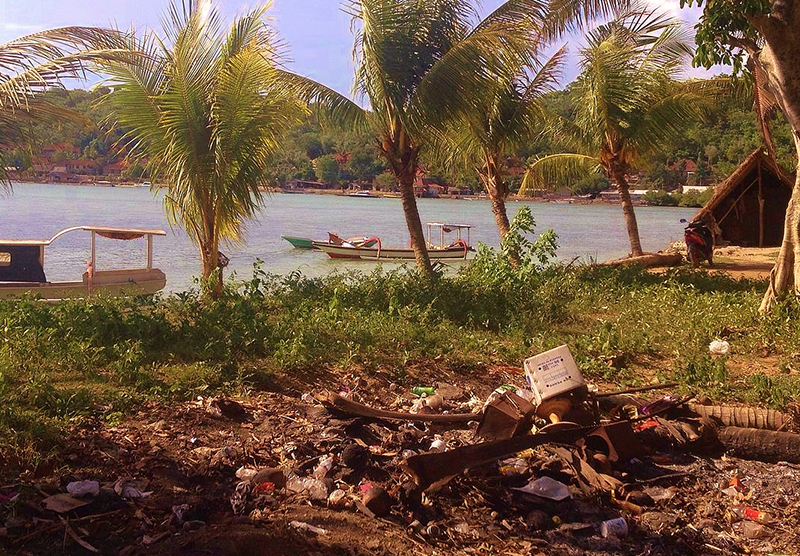Marine Trash Waste Management - 'Clean Islands, Healthy Seas'

Did you know? Indonesia is world’s 2nd largest marine plastic polluter?
Indonesia trashes over 3 million tonnes of plastic pollution every year – much of it ending up in the world’s oceans, carried on sea currents to neighbour countries like Australia’s beaches and coral reefs, causing death to many marine creatures mistaking plastic for food or trapped in marine debris.
And now, two giant ocean garbage dumps, named Gyres, have formed across the Asia-Pacific region - Indian Ocean Gyre is south of Indonesia, and east of Australia is the South Pacific Gyre - full of trash carried on sea currents from across Asia and other countries.
· Do we feel “malu”?
‘Clean Islands, Healthy Seas’
On Nusa Ceningan – a Bali sister island in the Nusa Penida Marine Protected Area - there is no infrastructure for waste management, the same on many of Indonesia’s thousands of rapidly developing islands and tourism zones.
Community leaders of Nusa Ceningan have asked IDEP Foundation for urgent help to tackle the island’s waste management problem.
As tourist growth increases from popular destination islands in the Nusa Penida islands group, the island communities end up with more trash tonnage to handle – unfortunately, much of it is burned, buried on the beach or ends up in the sea.
Following previous IDEP education programs conducted on Nusa Ceningan – IDEP has designed a pilot model system for source-reduction in plastic waste management to to help tackle this small island’s household and tourism waste.
‘Clean Islands, Healthy Seas’ – is a sustainable, community-enterprise system – that cleans up land and sea, and helps generate income for community benefit – a circular economy pilot model designed for small developing islands, such as Nusa Ceningan, off Bali, in Nusa Penida Marine Protected Area (MPA) – inside the Coral Triangle of Indonesia.
Based on inclusive-conservation methods, ‘Clean Islands, Healthy Seas’ incorporates environmental preservation with sustainable community development goals, and IDEP’s mission of “helping people to help themselves” by “understanding our interconnectedness with Nature”.
This win-win circular economy pilot model aims to be self-sustainable within 2 years – IDEP will plan to replicate this model in the future to other small developing islands which have no waste management infrastructure – in eastern Indonesia, close to the Throughflow Current that carries marine trash to the giant ocean gyres, neighbouring countries and cause of death to many marine creatures that mistake plastic for food or are trapped in garbage and drown. .
To address the environmental issues on Nusa Ceningan, IDEP will pilot the project in partnership with community-based disaster management organization, Komunitas Masyarakat Penangulangan Bencana (KMPB) once launch funding is achieved.
SPONSOR:
Help launch “Clean Islands, Healthy Seas” plastic waste recycling program – to make this exciting pilot program a reality!
Kita butuh dukungan kalian untuk menjalankan program “Pulau Yang Bersih, Lautan Yang Sehat” daur ulang sampah plastik dan menjadikannya nyata!
Contact IDEP for a CSR/ sponsor proposal: This email address is being protected from spambots. You need JavaScript enabled to view it.
Or
Make a Donation: http://www.idepfoundation.org/how-you-can-help/donate-today
Make a difference together – “help people to help themselves” - help clean up our seas!
Past programs implemented by IDEP on Nusa Ceningan:
→ Waste Disposal Management: IDEP trained students, teachers, and other community members in waste separation, paper recycling, and creative ways to reuse plastics. 30 members of PKK were trained in waste management, including producing products from plastic waste.
→ Seaweed Harvesting and Processing: Additionally, IDEP instructed 30 PKK members in the optimal processing of seaweed and on manufacturing products from seaweed (i.e. flour).
→ Disaster Risk Reduction Training: IDEP trained students, teachers, and community members how to make a risk map, create an evacuation plan, and how to perform emergency first aid.
Other successful activities of this program include training of the students and women's groups in recycling paper and plastic materials to be converted into marketable practical items such as bags and multipurpose cases. The products were sold in various Community Awareness outlets and supporting stores in Bali.
Help IDEP share these successful models with other seaside communities by making donation to IDEP Foundation.
Completed Programmes
|






